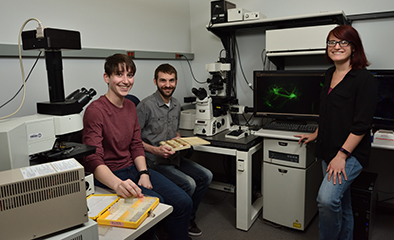CBMP Faculty
Peter F. Drain, Ph.D.

Department: Dept of Cell Biology
Email: drain@pitt.edu
PubMed: Link
Dept / Lab Webpage: http://www.cbp.pitt.edu/faculty/drain.html
CBMP groups: Genomics, Proteomics and Metabolomics
Research Interests
Our laboratory studies pancreatic β cell biology focused on insulin secretory granule proteins regulating trafficking and exocytic release, and β cell proliferation and anti-oxidant pathways underlying its adaption to oxidative stress in the setting of diabetes mellitus. In pancreatic β cells, the KATP channel brings insulin secretion under the control of blood glucose levels. Our major goal is to establish the molecular mechanisms underlying how ATP binding to the KATP channel signaling changes in glucose metabolism, in turn, signals commensurate changes in insulin granule trafficking and exocytosis. Normally, the fraction of time the KATP channel spends in the inhibited state determines insulin secretory rates. When this regulation goes awry, serious complications at the whole-organism level lead to diabetes and other diseases. (1) We have demonstrated how ATP binding to the Kir6.2 subunit of the KATP channel electrostatically couples to the transmembrane domain to cause gate closure. One of the positions of the KATPchannel required for this signaling is mutated in the conserved position of the human KATP channel in permanent neonatal diabetes (PNDM). (2) We have also combined confocal fluorescence microscopy and a novel molecular strategy to visualize insulin secretion in live β cells. The Ins-C-GFP reporter has exploded the ability to look inside live insulin secreting β cells to study glucose-stimulated insulin granule trafficking and exocytosis. Using this approach, we have localized KATP channels to insulin secretory granules. (3) Currently, we are using fluorescent reporters of oxidative stress to explore glucolipotoxicity and its reversal by anti-oxidant and proliferative pathways in pancreatic β cells. (4) Most recently, we are interrogating the role of granule KATP channels and its small molecule and protein ligands in regulating insulin secretion and β cell proliferation. Trainees in our laboratory are mentored in the exploration of scientific reasoning in health and disease by applying molecular genetics, confocal live-cell fluorescence imaging, native fluorescent protein gels, and western blotting, with insulin, stress, and cell proliferation ELISAs, to understand β cell biology in health and disease.
